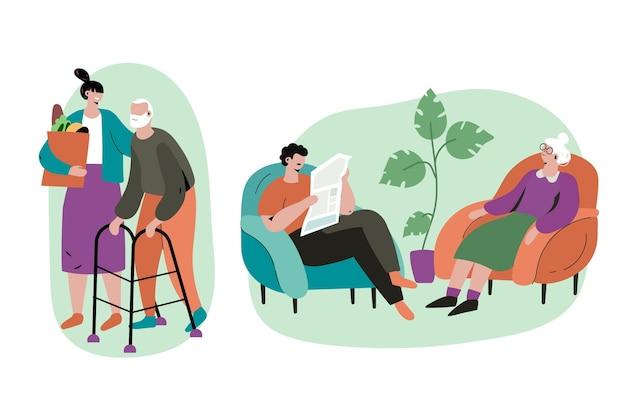Addiction is a widespread issue, and traditional therapies often fall short in providing long-term solutions. Gestalt therapy, an approach that emphasizes self-awareness and personal responsibility, is gaining popularity in treating addiction. However, this controversial therapy has raised questions about its effectiveness, safety, and legitimacy. In this blog post, we’ll delve into the world of gestalt therapy addiction, its techniques, duration, controversy, and suitability for different individuals.
First, we’ll explore the core principles of gestalt therapy and how it addresses addiction. Then, we’ll discuss the various techniques involved in the therapy, including mindfulness, dialogue, and experiential exercises. We’ll also answer some of the most frequently asked questions, including how long the therapy lasts and who should not use gestalt therapy.
As we delve deeper into this topic, we’ll examine the controversies around gestalt therapy, including its being an unregulated form of therapy and allegations of unethical practices. Finally, we’ll assess the effectiveness of gestalt therapy for addiction and provide practical insights on how it can help individuals overcome their addiction.
Join us on this enlightening journey to discover the world of gestalt therapy addiction and uncover why it’s been a topic of both fascination and controversy for many years.
Gestalt Therapy for Addiction: Understanding the Basics
Gestalt Therapy for addiction is a holistic approach that aims to bring about awareness and self-acceptance in the individual struggling with addiction. This therapy was developed by Fritz Perls in the 1950s and involves a range of techniques such as mindfulness, role-playing, creative expression, and body work.
How Does Gestalt Therapy Work
Gestalt Therapy works under the premise that addiction arises out of a lack of self-awareness and a disconnection from oneself. Through the therapy, individuals are encouraged to become more aware of their thoughts, feelings, and behaviors and develop a sense of self-responsibility. This increased self-awareness allows individuals to recognize their triggers and patterns of behavior that lead to addiction and develop strategies to counteract them.
The Role of the Therapist
The therapist in Gestalt Therapy for addiction serves as a facilitator, providing a safe environment for clients to explore their experiences and emotions. They encourage clients to express themselves creatively and provide feedback on non-verbal cues such as body language and tone of voice. This feedback helps clients become aware of how their non-verbal cues affect their communication and relationships.
Benefits of Gestalt Therapy for Addiction
Gestalt Therapy for addiction has several benefits, including:
- Increased self-awareness
- Improved communication skills
- Enhanced emotional intelligence
- Reduced anxiety and stress
- Greater self-acceptance

In conclusion, Gestalt Therapy for addiction offers a powerful approach for those seeking to overcome their addiction. It empowers individuals to take control of their lives and break free from the pattern of addiction. Through increased self-awareness and self-acceptance, individuals can develop the necessary skills to maintain sobriety and live fulfilling lives.
Gestalt Therapy Techniques
Gestalt therapy is a form of therapy that emphasizes the present moment experience and encourages personal responsibility for one’s thoughts, feelings, and actions. In this subsection, we will explore the techniques used in gestalt therapy.
The Empty Chair Technique
One of the most well-known techniques used in gestalt therapy is the empty chair technique. The client is asked to imagine a person or situation that they have unresolved feelings towards, and then they are asked to place an empty chair in front of them and speak to the imaginary person or situation as if they were sitting in the chair. This technique can help the client to gain insight and understanding into their feelings and to express them in a safe and controlled manner.
The Two-Chair Technique
Another variation of the empty chair technique is the two-chair technique. In this technique, the client is asked to imagine two conflicting parts of themselves and to sit in one chair representing one part and then to move to the other chair representing the other part. This technique can help the client gain insight into internal conflicts and find ways to resolve them.
The Dialogue Technique
The dialogue technique is a technique that helps clients to better understand their relationships with others. The therapist asks the client to imagine the other person and to engage in a dialogue with them. The therapist may also act as the other person, allowing the client to express their feelings in a safe and controlled environment.
Dream Work
Gestalt therapy also incorporates dream work, which involves the client sharing their dreams with the therapist and exploring the symbols and meanings behind them. This technique can help the client understand unconscious thoughts and feelings and gain insight into their current struggles.
Gestalt therapy techniques aim to integrate the mind, body, and emotions to promote wholeness and well-being. By using these techniques, clients can gain insight and understanding into their thoughts, feelings, and behaviors and learn how to make changes that lead to a more fulfilling life.
How Long Does Gestalt Therapy Last
Gestalt therapy can vary in duration depending on the individual’s needs and the severity of their addiction. Typically, gestalt therapy sessions can last anywhere from 60-90 minutes. This allows for enough time to discuss the various issues the person is facing and explore potential solutions.
Long-Term Therapy
Gestalt therapy is not a brief therapy approach, and treatment can last for several months or even years. Long-term therapy may be a necessary approach for serious addiction issues that require a more comprehensive and in-depth approach. In some cases, the therapist may recommend ongoing treatment even after the addiction has been resolved to help the individual maintain their sobriety and continue to work on their mental health.
Short-Term Therapy
Short-term therapy may be suitable for individuals who require a more focused approach or have time constraints. This type of therapy can be completed in just a few weeks or months, depending on the individual’s progress and goals.
Evaluating Progress
Throughout gestalt therapy, progress evaluations are conducted to review the individual’s progress and determine if any adjustments need to be made to their treatment plan. These evaluations may occur every few weeks or months, and the therapist may use various tools to track progress, including mood diaries, questionnaires, and assessments.
In summary, the length of gestalt therapy for addiction can vary depending on several factors, including the individual’s needs and the severity of their addiction. Long-term therapy may be necessary for severe addiction issues, while short-term therapy may be suitable for those with time constraints. Regardless of the duration, gestalt therapy offers a comprehensive and holistic approach to treating addiction and can help individuals achieve long-term sobriety.
Who Should Not Use Gestalt Therapy
Gestalt therapy is an effective approach to treating addiction and overall mental health, but it might not be suitable for everyone. Here are a few examples of who should not use Gestalt therapy:
People with Severe Mental Health Conditions
If you have a severe mental health condition, such as schizophrenia or bipolar disorder, Gestalt therapy may not be the best option for you. This type of therapy focuses on the present moment and may not address underlying issues associated with severe mental health disorders. If you’re not sure whether this therapy is right for you, talk to a mental health professional.
Individuals Who Are Unable to Manage Their Emotions
While Gestalt therapy encourages the expression of emotions, it requires the ability to regulate them. If you are unable to manage your emotions in a healthy way, you may struggle with Gestalt therapy. It may lead to more significant issues and have adverse consequences on your mental health.
Those with a Physical Illness
If you are dealing with a physical illness, such as a chronic condition that requires medical attention, it may be best to prioritise your physical treatment before starting Gestalt therapy. It’s important to take care of your physical needs before starting any new therapy or treatment plan.
People Who Are Not Willing to be Honest
Gestalt therapy requires honesty and self-reflection. If you are not willing to be transparent with your emotions and thoughts, then Gestalt therapy may not be effective. The therapist can only help you if you are willing to be open about your feelings.
In conclusion, while Gestalt therapy is a helpful approach to addiction and mental health treatment, it may not be suitable for everyone. If you fall under any of the categories mentioned above, it may be best to talk to your therapist or healthcare provider about alternative treatments that might be more suitable for you. Remember, it’s crucial to prioritize your mental and physical wellbeing.
Why is Gestalt Therapy Controversial
Gestalt therapy is a type of psychotherapy that focuses on the present moment, rather than past experiences, to help individuals improve their overall well-being. While some consider it a highly effective form of therapy, others are more skeptical and even critical of its effectiveness. Below are some of the reasons why Gestalt therapy is controversial.
Lack of Scientific Evidence
One of the main criticisms of Gestalt therapy is the lack of scientific evidence to back its claims. Unlike other therapies that have studies to support their effectiveness, Gestalt therapy lacks such research, largely because it’s challenging to conduct experimental research in therapy. As a result, many people are skeptical of its effectiveness and may not trust it as a reliable treatment option.
Focus on the Here and Now
Another controversial aspect of Gestalt therapy is its focus on the present moment. While some people find this approach lifesaving, others argue that it’s not enough to resolve deeper, long-standing issues. Critics argue that the therapy doesn’t address the root causes of an individual’s problems, which ultimately limits its effectiveness.
Cost and Time Commitment
Gestalt therapy can be costly and time-intensive. Unlike other types of therapy that rely heavily on medication or equipment, Gestalt therapy depends heavily on personal interaction and experiences, which often require multiple sessions. Because of this, some people may find the length of the therapy, and the time and commitment required to be overwhelming.
Controversial Techniques
Gestalt therapy uses several techniques that can be uncomfortable or even unsettling for some individuals. For example, the therapists may use role-playing exercises that require individuals to confront their fears and insecurities head-on. This approach can sometimes increase stress levels, which can make it a less attractive option for some individuals.
The Therapist’s Style and Expertise
Finally, another factor that can make Gestalt therapy controversial is the individual therapist’s style and expertise. Because Gestalt therapy is highly individualized, the therapist’s approach can have a significant impact on a person’s overall experience. As a result, some people may not feel comfortable with their therapist, which can affect the therapy’s overall effectiveness.
In conclusion, Gestalt therapy is a highly controversial form of therapy. While some people find it effective, others are more skeptical due to the lack of scientific evidence and the therapy’s unique approach. Ultimately, the effectiveness of Gestalt therapy will depend on the individual’s willingness to engage with the process and the therapist’s knowledge of the approach.
Is Gestalt Therapy Good for Addiction
When it comes to addiction treatment, many people are turning to Gestalt therapy as a viable option. But, is Gestalt therapy really good for addiction? Let’s explore this subtopic and find out.
Understanding Gestalt Therapy
Gestalt therapy is an experiential and humanistic form of psychotherapy that focuses on helping individuals live in the present moment by increasing their self-awareness and exploring their thoughts and behaviors in the here and now. The key principles of Gestalt therapy are the importance of the present moment, the concept of the “whole self,” and the emphasis on self-exploration.
The Role of Gestalt Therapy in Addiction Treatment
Gestalt therapy plays a significant role in addiction treatment by helping individuals identify and explore the underlying emotional issues that contribute to their addictive behaviors. Through self-exploration, individuals gain insight into the reasons why they turn to drugs or alcohol, and they learn how to cope with these underlying issues without resorting to addictive behaviors.
Gestalt Therapy and Mindfulness Practice
One of the primary techniques used in Gestalt therapy is mindfulness practice. Mindfulness is the practice of staying present and aware of one’s thoughts, feelings, and surroundings without judgment. By incorporating mindfulness practice into the treatment plan, individuals learn how to stay present and aware of their thoughts and emotions without allowing them to control their actions.
The Effectiveness of Gestalt Therapy in Addiction Treatment
Research has shown that Gestalt therapy can be highly effective in treating addiction. In one study, individuals who received Gestalt therapy had significantly higher rates of abstinence from drugs or alcohol compared to those who received traditional treatment. Gestalt therapy has also been shown to improve anxiety, depression, and other mental health conditions that often co-occur with addiction.
Is Gestalt therapy good for addiction? Yes, it certainly is. Gestalt therapy provides a holistic and experiential approach to addiction treatment that focuses on increasing self-awareness, exploring underlying emotional issues, and developing coping strategies to overcome the addiction. If you’re struggling with addiction, consider adding Gestalt therapy to your treatment plan.


